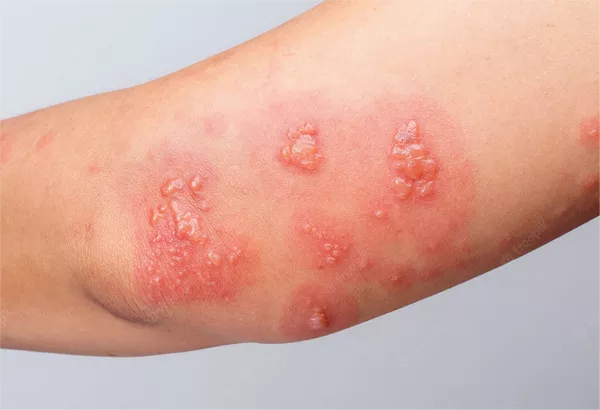Shingles is a painful viral infection caused by the varicella-zoster virus, the same virus responsible for chickenpox. Once a person recovers from chickenpox, the virus remains dormant in the body, specifically in the nerve tissues. However, as the body ages or if the immune system becomes weakened, the virus can reactivate and cause shingles. The good news is that there are several steps you can take to avoid shingles recurrence. This article will provide you with detailed information on how to prevent future outbreaks and protect your skin health.
Understanding Shingles and Its Causes
Shingles, also known as herpes zoster, typically affects older adults, but it can occur in anyone who has had chickenpox. The virus lies dormant in the body and can reactivate when the immune system is weakened. The reactivation leads to the painful blisters and rashes associated with shingles.
Shingles can cause severe pain, called postherpetic neuralgia, which can last for weeks or even months after the rash heals. People who have had shingles are at risk of having it again, especially if their immune system is compromised. Understanding the factors that contribute to shingles recurrence is crucial for prevention.
Strengthen Your Immune System
A strong immune system plays a key role in preventing the recurrence of shingles. When your immune system is functioning well, it can keep the varicella-zoster virus in check and prevent it from reactivating. To boost your immune health, you should focus on maintaining a balanced lifestyle that includes proper nutrition, exercise, and stress management.
Eat a Healthy Diet: A balanced diet rich in fruits, vegetables, lean proteins, and whole grains is essential for keeping your immune system strong. Foods high in antioxidants, such as berries, spinach, and nuts, can help fight inflammation and support immune function. Vitamin C and zinc are particularly important for immune health, so consider incorporating citrus fruits, peppers, and seeds into your diet.
Exercise Regularly: Regular physical activity improves overall health and strengthens the immune system. Aim for at least 30 minutes of moderate exercise most days of the week. Activities like walking, cycling, and swimming can help keep your body strong and resilient against infections.
Manage Stress: Chronic stress can weaken the immune system and trigger shingles outbreaks. Find ways to manage stress through relaxation techniques like deep breathing, yoga, or meditation. Adequate sleep is also essential for stress management and immune function. Aim for 7-9 hours of sleep each night to allow your body to recover and maintain optimal health.
Get Vaccinated
One of the most effective ways to prevent shingles recurrence is by getting vaccinated. The shingles vaccine can significantly reduce your risk of developing shingles and its complications. The vaccine is recommended for adults over the age of 50, even if you have already had shingles before. In fact, getting the vaccine after a shingles outbreak can help lower the chances of recurrence.
There are two types of shingles vaccines available: Zostavax and Shingrix. Shingrix is the preferred vaccine as it is more effective and provides longer-lasting protection. It is given in two doses, with the second dose administered 2 to 6 months after the first. Talk to your healthcare provider about which vaccine is right for you.
Maintain a Healthy Lifestyle
Leading a healthy lifestyle can help reduce the likelihood of shingles recurrence. This involves avoiding risk factors that can compromise your immune system, such as smoking and excessive alcohol consumption. Both smoking and heavy drinking can weaken the immune system and make it more difficult for your body to fight off infections.
Avoid Smoking: Smoking damages the lungs and weakens the immune system, increasing the risk of infections like shingles. Quitting smoking can improve your overall health and reduce your risk of shingles recurrence.
Limit Alcohol Consumption: Excessive alcohol consumption can also impair immune function. Drinking alcohol in moderation or abstaining altogether can support your immune system and help prevent shingles.
Stay Hydrated: Dehydration can weaken your body’s defenses, so make sure to drink enough water throughout the day. Aim for at least 8 glasses of water daily, and more if you are physically active or live in a hot climate.
Manage Chronic Health Conditions
Certain chronic health conditions can weaken the immune system and increase the risk of shingles recurrence. Conditions like diabetes, HIV/AIDS, cancer, and autoimmune diseases make the body more susceptible to infections. Managing these conditions properly can help prevent shingles outbreaks.
Control Diabetes: If you have diabetes, it is important to keep your blood sugar levels under control. High blood sugar can weaken the immune system, making it easier for the varicella-zoster virus to reactivate. Work with your healthcare provider to monitor your blood sugar and manage your diabetes effectively.
Treat Autoimmune Diseases: If you have an autoimmune disease, such as rheumatoid arthritis or lupus, it is important to follow your doctor’s recommendations for managing the condition. Some treatments for autoimmune diseases, such as immunosuppressive medications, can weaken the immune system, so it is important to talk to your healthcare provider about ways to protect yourself from infections like shingles.
Manage HIV/AIDS: People with HIV/AIDS have a weakened immune system and are at higher risk for shingles. Antiretroviral therapy (ART) can help control the virus and improve immune function. If you have HIV, make sure to stay on your prescribed treatment plan to reduce your risk of shingles.
Avoid Shingles Triggers
Certain factors can trigger the reactivation of the varicella-zoster virus and increase the risk of shingles recurrence. While some triggers are unavoidable, such as aging, others can be controlled. Being mindful of these triggers and avoiding them when possible can help prevent future outbreaks.
Avoid Exposure to Stress: As mentioned earlier, stress is a major trigger for shingles outbreaks. Practice stress-reducing techniques like relaxation exercises, mindfulness, or engaging in activities you enjoy. If possible, try to reduce the sources of stress in your life to prevent triggering shingles.
Protect Your Skin from Sunburn: Prolonged exposure to the sun can weaken the immune system and trigger a shingles outbreak. Protect your skin by applying sunscreen regularly and wearing protective clothing when outdoors. Avoid being in the sun during peak hours, typically between 10 a.m. and 4 p.m.
Avoid Illnesses and Infections: Infections, such as colds, the flu, or other viral infections, can weaken the immune system and increase the risk of shingles. Practice good hygiene, such as washing your hands regularly, to reduce your chances of getting sick. If you are exposed to someone with a contagious illness, take extra precautions to protect yourself.
Seek Medical Advice
If you have had shingles before, it is important to discuss your risk of recurrence with your healthcare provider. They can offer advice on how to reduce your risk and may recommend additional treatments or therapies to support your immune health. For example, if you are at a higher risk for recurrence due to age or a weakened immune system, your doctor may suggest additional vaccinations or antiviral medications.
In some cases, antiviral medications like acyclovir, valacyclovir, or famciclovir may be prescribed to help prevent shingles recurrence. These medications work by inhibiting the varicella-zoster virus from replicating, which can reduce the likelihood of an outbreak.
Conclusion
Shingles recurrence can be prevented through a combination of lifestyle changes, medical interventions, and good skin health practices. Strengthening your immune system, getting vaccinated, maintaining a healthy lifestyle, managing chronic conditions, and avoiding triggers are all essential steps to reduce the risk of shingles. If you are concerned about your risk of recurrence, speak with your healthcare provider to develop a personalized plan for prevention.
By following these steps and being proactive about your health, you can significantly reduce the chances of shingles reactivating and ensure that your skin remains healthy and protected.
Related topics


























